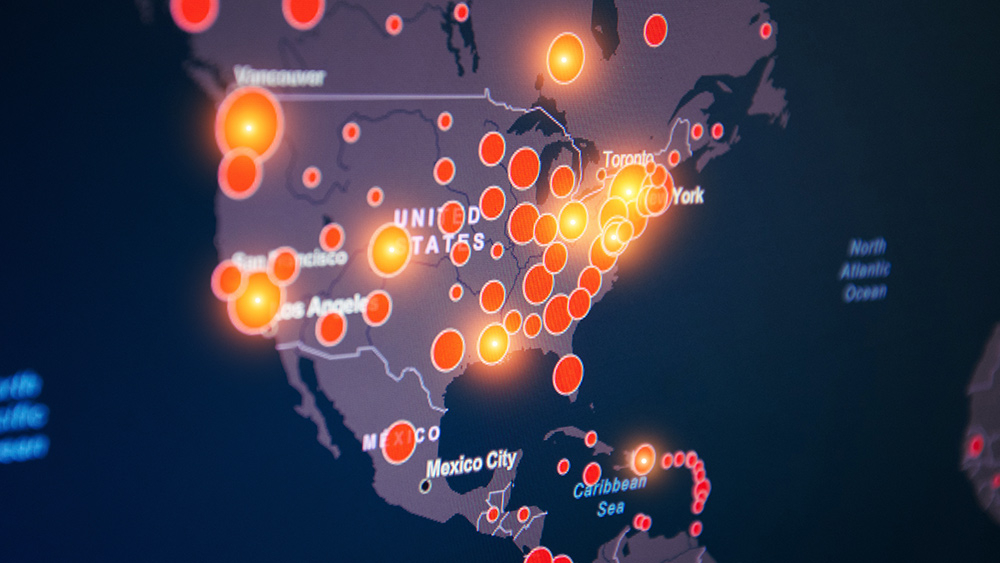Asia-Pacific braces for second wave of coronavirus: China insists it’s under control, Japan to finally declare emergency… and North Korea remains virus-free?
04/06/2020 / By Ralph Flores

The epicenter of the coronavirus outbreak could shift back to Asia, as the number of new cases in the region rose again this weekend.
In mainland China, health authorities reported a surge in coronavirus cases over the weekend. The National Health Commission (NHC), the country’s lead agency for coronavirus response, reported 125 asymptomatic cases, as well as 69 confirmed cases, bringing the country’s total to 82,665 as of Monday evening. The NHC also said that most of the new cases were from people who had entered China from abroad.
A case of local transmission involved a person who traveled from Hubei province to the southern province of Guangdong, according to provincial authorities. In response, the provincial health commission raised its risk level from low to medium in certain parts of Guangdong province.
Meanwhile, another province in central China has placed a large number of people in total lockdown for fear of a second wave of coronavirus infections. Local officials ordered residents of Jia county in Henan province to stay home, according to a notice on the country’s official microblog account. The notice also revealed that only people with special permits are allowed to leave their homes, provided they wear face masks and have their temperature taken.
The country has already barred all foreigners from entering amid concerns that international arrivals could trigger a second wave of infections.
CIA: Official figures from Beijing could be underreported
From reporting thousands of cases a day during the epidemic’s peak, Chinese health authorities are now saying that China is seeing fewer coronavirus cases and more days without local transmission.
According to reports from state media, President Xi Jinping, in a conference with United Nations Secretary-General Antonio Guterres, has expressed confidence that the country has already hurdled past the virus. (Related: Tucker Carlson: The WHO helped China cover up coronavirus.)
“After hard work, China has shown a trend of continuous improvement in epidemic prevention and control,” quoted the report. “I am confident that the Chinese people will be able to overcome this epidemic and achieve their intended economic and social development goals.”
As the country deployed medics and sent aid to other nations hit hard by the coronavirus, it has faced criticism over its own handling of the virus and its lack of transparency throughout the outbreak.
A report by the Central Intelligence Agency concluded that official tallies for coronavirus cases and fatalities are grossly misrepresented. In the report, published in the New York Times, the agency suggested that the Chinese government itself might not know the extent of the virus. Reports from the epicenter in Wuhan and other places could be unreliable, as many officials fear that reporting high numbers could lead to punishment or worse.
While China has trumpeted the success of its draconian lockdown measures in flattening the curve, health experts have raised concerns that the figures released by the Chinese government are incomplete. The NHC, for instance, did not include in its report the number of asymptomatic cases until last week.
In a news conference on Wednesday, Robert O’Brien, the U. S. national security adviser, took note of Beijing’s controversial figures.
“There’s no way to confirm any of those numbers,” he added. “There’s lots of public reporting on whether the numbers are too low.”
Japan poised to declare state of emergency
Last week also saw a surge in new cases in Tokyo, with over 1,000 confirmed cases bringing Japan’s total caseload to 3,654, according to the latest tally from Johns Hopkins University. In response, Prime Minister Shinzo Abe is poised to declare a state of emergency in Tokyo and six other regions to stymie the coronavirus spread and prevent a major outbreak in the world’s biggest city.
Under the month-long state of emergency, governors of affected prefectures will have additional powers to close schools and businesses. However, they cannot order citizens to stay home.
“In Japan, even if we declare a state of emergency, we will not close cities as seen in foreign countries. Experts have told us that there is no need for such a step,” Abe said.
“Not one single person” is infected in North Korea, says health officials
A senior health official from Pyongyang has said that North Korea remains free of the deadly coronavirus. In a statement, Pak Myong Su, director of the anti-epidemic department of North Korea’s Central Emergency Anti-Epidemic Headquarters, insisted that the country’s measures, in particular, its early border lockdown with China and strict containment, meant that no one in the country has contracted the coronavirus.
“We have carried out preemptive and scientific measures such as inspections and quarantine for all personnel entering our country and thoroughly disinfecting all goods, as well as closing borders and blocking sea and air lanes,” added Pak.
However, military experts are doubtful, saying that the hermit kingdom — which shares its borders with China and South Korea, the two hardest-hit countries during the outbreak — is particularly vulnerable, and its assertion could potentially be a cover-up.
“I can tell you that is an impossible claim based on all of the intel that we have seen,” explained Gen. Robert Abrams, commander of United States Forces Korea. “I can tell you that is an impossible claim based on all of the intel that we have seen.”
Learn more about the ongoing coronavirus pandemic at Pandemic.news.
Sources include:
Tagged Under: China, coronavirus, covid-19, Flu, infections, Japan, local transmission, North Korea, outbreak, pandemic, second wave of infections, State of Emergency, superbugs, virus
RECENT NEWS & ARTICLES
Pandemic.News is a fact-based public education website published by Pandemic News Features, LLC.
All content copyright © 2018 by Pandemic News Features, LLC.
Contact Us with Tips or Corrections
All trademarks, registered trademarks and servicemarks mentioned on this site are the property of their respective owners.





















